




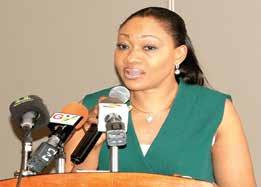







Energy analysts Chamber of Petroleum Consumers (COPEC) has predicted that fuel prices are likely to see a decline in the rst pricing window of March 2023.
According to COPEC, prices of both petrol and diesel have all declined marginally within the period while crude price has also minimally dropped from $82.99/barrel to $82.48/barrel (-0.61%).
The chamber said with the international price decreasing from $878.41/MT to $849.25/MT (-3.32%), the retail price works up to GHS13.66/L. “Petrol Retail prices are therefore expected to drop by 3.73% from the current Mean value of GHS14.20/L. With the International price decreasing from $854.00/MT to $809.38/MT (-5.22%), and the increase in the Dollar rate, the expected mean retail price for the next window shall be GHS13.98/L.
Thus, Diesel prices are therefore expected to drop by 4.04% from the current Mean value of GHS14.57/L,” it added.
The analysts said following from the basic assumptions, that prices of both petrol and diesel have all declined marginally within the period whiles Crude price has also minimally dropped from $82.99/barrel to $82.48/barrel (-0.61%)

Though the Dollar exchange rate has seen a slight increase from averages of GHS12.4697 to GHS12.8650 (3.17%) per $1, further considering the CBOD rate of about $1=GHS14.00, the following shall form the

predicted retail gures for Petroleum products from computations by the technical and pricing team, for the 1st pricing window of March under the price deregulation programme of the National Petroleum Authority, which window commences on Wednesday, 1 March 2023. All understated Predictions are factored to be within (+/-)5%, they added.
Petrol
With the international price decreasing from $878.41/MT to $849.25/MT (-3.32%), the retail price works up to GHS13.66/L
Petrol Retail prices are therefore expected to drop by 3.73% from the current Mean value of GHS14.20/L
Diesel
With the International price decreasing from $854.00/MT to $809.38/MT (-5.22%), and the increase in the Dollar rate, the expected mean retail price for the next window shall be GHS13.98/L. Thus, Diesel prices are therefore expected to drop by 4.04% from the current Mean value of GHS14.57/L
Mean Price of Petrol and Diesel
The Mean price of Petrol and Diesel shall be 13.82/L.
With the international price increasing from $699.45/MT to $702.50/MT (4.94%) the projected retail price of LPG is expected to increase by about 4.36% from the current average of 13.86/kg to GHS14.46/kg.
These expected drops in prices for the second time running since the second pricing window of February 2023 do not have any correlation with the much-touted Gold for Oil programme as these movements are simply a derivative of market forces at play within the period, we still await the reductions the two cargoes brought in this month will add to the relieving the su ering of the petroleum consumer


The current high retail prices of LPG have contributed to consumption generally dropping by 12% year on year in 2022, It will be prudent If authorities did take a second look at the factors contributing to the high prices of a commodity which Ghana has in enormous commercial quantities to ensure price stability or decline if the government’s 50% penetration target is to be ever achieved and to continuously promote its usage with the overall environmental promotion in mind.
The Chairperson of the Electoral Commission, Jean Mensa, has told parliament that under the continuous registration exercise, the commission would be saving the country GHc40m by using its own internal sta as opposed to engaging external hands.
According to her, the EC would be using its own sta to perform
those functions and “the rough estimate is that we will be saving this country GHc40m.”
Appearing before parliament’s Committee of the Whole alongside o cials of the National Identi cation Authority (NIA) on Tuesday to brief lawmakers on the pre-laying draft Constitutional Instrument (CI) that seeks to
make the Ghana Card as the sole identi cation for a voter, she said “We do not envisage disenfranchising Ghanaians. More so, what we are seeking to do is continuous exercise; we have up to October 2024, we are not closing the register now.
I want to assure the House the commission does not intend to
prepare a new register, what we are seeking to do with the continuous registration is update the existing registration.”
The draft CI before Parliament seeks to promote the Continuous registration of voters and advocates for an all year- round registration of eligible voters at the district o ces of the EC. It is a clear departure from the previous system where voters registration was done for a limited period.
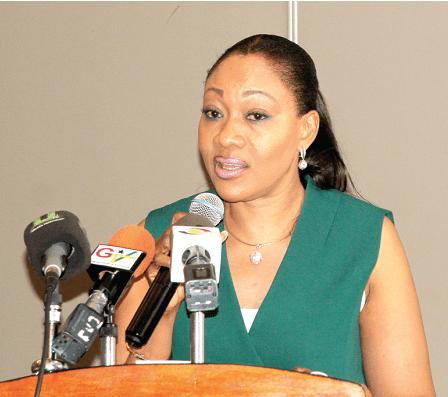
Further, the EC chairperson explained that today, with 16 million Ghanaians in possession of the Ghana Card, and with NIA's assurance that it will print and distribute the remaining cards to registrants in a matter of weeks, “we do not believe that we will disenfranchise persons by enforcing the policy requirement of using the Ghana Card to prove one's eligibility.”
The use of the Ghana Card as the sole means of identi cation will prevent foreigners and minors from getting onto our Voters Register. More especially it will prevent unquali ed persons from in uencing our elections and having a say as to who should govern our country, she added.
The Executive Secretary of the National Identi cation Authority (NIA) Prof.Ken Attafuah also disclosed that the total number of Ghanaians captured onto its database as at February 19,2023 stands at 17.3m [17,375,861] with 16m cards issued/collected.
A total of 642,403 NIA cards which have been printed nationwide but yet to be collected and 541,529 cards are yet to be printed. Out of Ghana’s total population of about 30m, about 2.5m citizens aged 15 years are yet to be captured by NIA.
According to him, the NIA can print the remaining over 500,000 cards within 11 days given availability of funds.
Finance Minister, Ken Ofori-Atta stated that all expenses related would be duly complied with, he added that GHc100m has been agreed to be transferred to[Cal Bank Merchant] aid NIA retrieve the 3.5m cards seized by commercial banks.
Minority unconvinced Minority Leader, Dr.Ato Forson stated that the ordinary Ghanaian
at the minimum should get access to the Ghana Card before the EC seeks to go ahead with the laying of a new constitutional instrument(CI) that makes the Ghana card the only form of identi cation for registration as a voter.
He maintained that the minority will not take part in the CI process if all outstanding issues are not resolved, stressing that the NIA should go and solve the issue of Ghana card rst before, they push for the CI.
“The EC cannot use ghana card as the only basis for registration to vote, we demand an independent veri cation of the numbers the NIA is giving us.”
Dr. Forson also disclosed that government owes service providers US$175m and until government settles those debt, it will not be prudent for the EC to move to lay a CI to use the Ghana card to establish citizenship to vote.
At an engagement session organised for its SME clients in Accra, Executive Director for Retail and Business Banking at Absa Bank, Kobla Nyaletey, said “Businesses need to survive the pre-IMF period and re-set their operations to thrive during the next phase. Cost containment, a no-frills approach to operations and a focus on getting cash into their businesses early, will be key.”
“Liquidity is king in volatile times. Businesses that generate frequent cash, have low receivables and diversify their business models from a reliance on big ticket contracts, will survive and begin to thrive when the economic challenges recede.”
Absa Bank has implored small and medium scale enterprises (SMEs) to adjust their operations and prioritise liquidity to survive the current economic challenges. The country has made good progress in restructuring its domestic debts under an exchange programme that was concluded
earlier this month. Negotiations for an IMF bailout programme is also underway. However, until that is concluded, the economy continues to face challenges, evident in high in ation, a weak exchange regime and high interest rates – all unfavourable to businesses.
The SME clinic, attended by over 200 clients, was under the theme:
“Survive and Thrive: tactics for uncertain times.” It was also the rst in-person SME engagement for the bank’s customers since the COVID-19 pandemic.
In her opening remarks, Head of
SME Banking and Partnerships at Absa Bank, Audrey Abakah reiterated the bank’s commitment to creating a learning platform for SMEs to build capacity and enhance their knowledge in nancial management. She advised participants to also leverage customer service experience to transform their clients into net promoters for free.
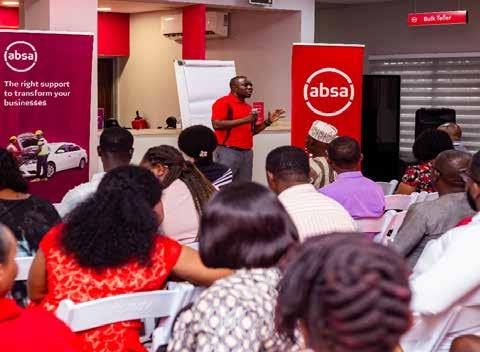
As part of the engagement, the SME businesses were taken through a series of practical sessions, including liquidity management, cost line management, revenue generation and utilisation of credit lines.
The Absa SME Clinic was created to assist SMEs in gaining access to the Bank's specialised capacity-building programme, which aims to inform and assist small businesses to operate strong and sustainable enterprises. It also provides a platform for direct communication between customers and the Bank.
Ghana International Bank (GHIB), a wholly-Ghanaian bank incorporated in the United Kingdom, has facilitated a trade nance training programme for over 60 bankers from across six West African countries.

The four-day trade nance training seminar in Ghana focused on various international trade nance products that banks can use in serving their customers.
Speaking to the media at the closing ceremony of the training, Baafuor Ohene Abankwah, the Country Representative, Ghana and Head, Client Coverage Africa, said the training is part of GHIB’s e orts to deliver quality banking services and provide a bridge to Ghana's banking institutions.
"As a wholly Ghanaian bank incorporated in the UK, we have been the heart of trade nance in Africa for many years, dating back to the 1950s." We believe that we have a role to play in building trade nance capacity so we are passionate about organising such training programmes. This is the eighth session, and we have over 60 bankers from across
six countries in West Africa present to be equipped on how to facilitate trade between the countries they represent and the rest of the world".
"Also, there are huge opportunities for trade nance on the African continent. Here in Ghana, we have several products that are required in West Africa, and banks and nancial institutions can do more to facilitate that. Some of the ways in which banks can do that are to provide the nancing that allows factories to expand and businessmen to make and receive payments. "Banks have an important role to play, and intentional e orts such as this training to make sure we work together to promote trade in Africa will really help,", he added.
On his part, John Awuah, Chief Executive O cer of the Ghana Association of Banks, said the training is timely for banks in West Africa to further understand trade nance instruments that can help in the African Continen tal Free Trade Area (AfCFTA).
"The good thing about trade
nance is that it makes transaction costs a bit manageable because it is cheaper compared to conventional nancing, so trade nance products provide that bridge that enables businesses to access nancing in a more cost-effective manner."
"We have had a very engaging session with the facilitators of this programme focused on understanding trade nance instruments—the instruments that we use to undertake international trade as banks working for our customers. We can only refer the right nancial instruments to our
and get their goods delivered to their doorstep when banks better understand this topic," he concluded.
GHIB has contributed immensely to Ghana’s economy since its inception by working very closely with some banks in the Ghanaian space. The bank has facilitated the import of goods and the export of some of the commodities that Ghana produces. GHIB has been at the heart of some of the biggest syndicated transactions that Ghana has been engaged in and has been involved with remittance ows in Ghana
Huawei announced it has joined the UNESCO Global Alliance for Literacy (GAL) today as part of the company’s lead up to the Mobile World Congress 2023. The announcement was made at a Digital Talent Summit co-hosted by Huawei and the Institute for Lifelong Learning (UIL) which serves as the Secretariat of the GAL.
At the Summit, Huawei and the UIL agreed to jointly promote the use of technology to raise literacy. The two parties also signed a cooperation agreement under which Huawei will fund an expansion of the UIL’s current initiatives to enhance educators’ use of technology in developing countries. Currently, the UIL initiative operates in Bangladesh, Côte d’Ivoire, Egypt, Nigeria, and Pakistan.
Huawei is the rst private company to become an associate member of the GAL and the company is excited its own goals align
with the GAL’s vision of eradicating digital illiteracy in young people.
UIL Director David Atchoarena explained at the event, “Our rapidly changing world calls for concerted e orts and strong partnerships to achieve quality education and lifelong learning for all.”
Atchoarena continued, “Huawei’s expertise in the area of innovation in learning will be a great asset to the Global Alliance for Literacy. Collaborative projects such as ours will ensure that no one is left behind on this journey.”
Huawei’s own Vice President of Corporate Communications Vicky Zhang also commented, “Getting the right education is often the key to success in life. As a major player in the technology sector, Huawei feels it has a responsibility to provide technology skills in all parts of the world, trying our
best to include as many people as possible.”
“We are proud to join forces with UNESCO to better deliver on this responsibility,” Zhang added. Huawei believes digital talent is a key driver in achieving digital transformation, solid economic growth, and better quality of life. Since 2008, Huawei has o ered a wide and expanding range of talent programs. Under its Seeds for the Future umbrella, Huawei provides tens of thousands of people every year with scholarships and digital training courses targeting all age groups. The company also organizes and sponsors tech competitions where students can expand their knowledge, win prizes, and make new friends.
So far, Huawei’s Seeds for the Future program has helped nurture more than 2.2 million digital talents in over 150 coun-
tries. The company’s ICT Academy can train about 200,000 students each year. In 2021, Huawei announced it had already invested US$150 million and planned invest another US$150 million in digital talent development before 2026, which is expected to bene t an additional 3 million people.
Since its launch in 2016, the Global Alliance for Literacy has driven international discourse and guided the agenda for literacy provision globally for those who need it most. The alliance includes 30 countries committed to improving youth and adult literacy. It serves as a platform for its members to discuss progress and challenges together, and to exchange knowledge and good practice.
The Huawei Green ICT Summit was held in Barcelona today. Peng Song, President of ICT Strategy & Marketing of Huawei, delivered a keynote speech entitled "Green & Development, Choosing Not to Choose".

Peng pointed out that an AI Big Bang is underway. AI brings new bene ts and opportunities to operators. However, it also requires better ICT infrastructure, due to higher bandwidth and increased computing power leading to a rapid increase in network energy consumption.
" The ICT industry seems to be faced with the tough choice to either go green or develop. However, we believe the industry can choose not to choose, and instead go green and develop simultaneously " Peng said.
Peng pointed out that simultaneous green ICT and ICT development is possible if the right balance is struck between energy e ciency, renewable energy utilization, and user experience. At MWC Barcelona 2023, Huawei will launch solutions that embody this approach to pave the way for the green development of ICT infrastructure networks.
In terms of energy e ciency, Huawei advocates expanding the focus from just improving network energy e ciency to also reducing absolute energy consumption. In light-load scenarios, multi-dimensional shutdown technology can be employed to enable intelligent
shutdown across di erent dimensions, such as frequency, time, channel, and power. Meanwhile, in ultra-light-load scenarios, equipment can be put into a deep dormancy mode. For example, new materials and processes can be used to solve condensation and low temperature issues when AAU hardware shuts down. This enables the power module to independently remain in standby, meaning the power consumption of the AAU during extremely light load can be reduced from 300 W to less than 10 W.
In terms of renewable energy, the company calls for a focus expansion, from the scale of green power deployment to the e cient use of renewable energy. An upgrade from network-speci c policies to site-speci c policies can be undertaken in order to improve the accuracy of renewable energy deployment. Additionally, the time required for intelligent scheduling can be reduced from days to minutes, thus maximizing the economic and environmental bene ts of renewable energy. Multi-dimensional site information such as weather, electricity price, battery status, and service volume can be obtained, and intelligent scheduling algorithms can maximize power generation e ciency and load-based power availability, while minimizing overall power cost.
In terms of user experience, Huawei proposes that the focus
should no longer solely be on network energy saving and KPI assurance, but extend to user experience assurance. Optimal energy saving policies can be adopted according to di erent network scenarios. In low-tra c scenarios, basic network KPIs are guaranteed to maximize energy saving, while user experience is guaranteed in high-tra c scenarios. Experience-driven approaches are being upgraded to data-driven approaches, allowing energy-saving policies to be generated in minutes and optimization policies to be delivered in milliseconds.
Peng emphasized that Huawei iteratively updates its green solutions in accordance with its belief in the potential of the three aforementioned areas, and has launched the Huawei Green 1-2-3 solution. Within this solution, "1" refers to one index for green network construction; "2" refers to the focus on two scenarios:
high energy e ciency and ultra-low energy consumption; and "3" refers to a systematic three-layer solution that covers sites, networks, and operations. Peng closed his speech by highlighting Huawei's willingness to work with operators worldwide to strike a balance between going green and development, in order to accelerate green ICT development.
MWC Barcelona 2023 will run from February 27 to March 2 in Barcelona, Spain. Huawei will showcase its products and solutions at stand 1H50 in Fira Gran Via Hall 1. Together with global operators, industry professionals, and opinion leaders, we will dive into topics such as 5G business success, 5.5G opportunities, green development, digital transformation, and our vision of using the GUIDE business blueprint to lay the foundation for 5.5G and build on the success of 5G for even greater prosperity.
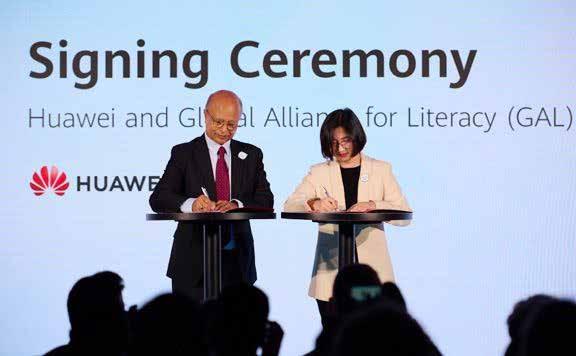
Tackling climate change and inequality would be di cult in the best of times. At a time when the war in Ukraine seems set to escalate, the Sino-American rivalry grows riskier by the day, and many economies are grappling with soaring debts and in ation, surmounting these challenges seems practically impossible. But even under unfavorable conditions, a systemic, bottom-up approach can yield progress.
In an increasingly divided global economy, conventional development strategies – which depend signi cantly on international trade and investment – are losing their e ectiveness. At the same time, the budgets of both national governments and multilateral development banks are stretched thin, owing to the demands of climate action, the pandemic recovery, debt repayment, and in many cases, con ict.
But the problem is even more fundamental. Poverty, inequality, climate change, and environmental degradation are complex systemic challenges. Yet prevailing policy approaches focus on devising separate solutions to speci c problems, or even speci c facets of problems, with little to no regard for how their solutions –and the underlying problems –interact.
The environmental scientist Donella Meadows de nes a system as “an interconnected set of elements that is coherently organized in a way that achieves something.” Our planetary system is failing, because the elements of it that humans can control are organized in ways that produce bad outcomes. Only by recogniz-
ing the interconnected nature of our social, ecological, and economic systems, and addressing problems holistically, can we optimize their functioning and ensure human and planetary well-being.
This cannot be achieved with the kinds of top-down, siloed solutions that governments overwhelmingly embrace. For example, when governments deploy specialized agencies to support rural village development, they increase transaction costs by delivering physical infrastructure piecemeal and failing to build shared databases that facilitate coordination. Weak ties to the local community can also undermine the e cacy of interventions. Multilateral action – implemented by nation-states – tends to be even less e cient. The scale of multilateral development banks and aid agencies is simply too large, with individual entities and actors each operating according to its own goals and standards.
What is needed instead are bottom-up strategies underpinned by community-based and nonpro t social enterprises (entities with both social objectives, in addition to economic targets).
E ective social enterprises are, to borrow management guru Peter Drucker’s description of successful nonpro ts, “dedicated to ‘doing good,’” but also “realize that good intentions are no substitute for organization and leadership, for accountability, performance, and results.”
Micro, small, and medium-size enterprises are far better equipped than their large counterparts to deploy the
mission-driven management social enterprises require. MSMEs – 90% of all businesses globally – account for 70-80% of total employment. These rms, which often make little or no pro t, are thus responsible for the livelihoods of billions of workers, making them invaluable repositories of knowledge about most people’s needs and interests. These interests include ecological imperatives, which are inextricably linked to economic and social considerations. The poorest and most vulnerable tend to be most a ected by environmental hazards, from pollution to natural disasters. At the same time, poverty can drive communities to over-exploit natural resources, like forests and sh stocks, in a desperate search for income.
Yet MSMEs do not have access to formal capital markets, let alone the holistic policy and institutional framework – including supporting infrastructure and a consistent legal environment – that would enable them to act as e ective social enterprises. A 2015 UN Development Programme report found that these shortcomings signi cantly impede social-enterprise development.
Meanwhile, a small number of massive rms enjoy enormous
wealth and market power – often translated into policy in uence. But even as multinationals tout their environmental, social, and governance goals, ESG considerations remain subordinate to pro t maximization. Less connected to local communities, these rms are not well-suited to provide the kind of bottom-up micro-solutions that, taken together, bring about systemic change. We have the tools and resources we need to tackle the collective challenges we face. There is no shortage of knowhow globally, nor scarcity of funding that could be mobilized from state, corporate, and charitable sources. And we have the means to distribute these assets. Already, technology has enabled the creation of a “global knowledge commons,” through which social enterprises can access the knowhow – and, through trusted accreditation, the nancing – they need.
But more must be done to make the most of these assets. Doing so would require leveraging existing technology, knowhow, and business models to help social enterprises achieve both sustainability and impact. More broadly, we must revise our sustainable-development strategies accordingly, recognizing that systemic problems demand systemic solutions.
In ful llment of government assurance to bondholders who did not tender their old bonds, the Ministry of Finance is taking administrative steps to ensure that payments of coupons and principals of the old bonds resume by March 13, 2023.
In a statement, the Ministry, however said the newly issued bonds have been settled and listed and will become the new benchmark bonds for the xed income market.
“The Ministry of Finance will work with relevant stakeholders, as agreed, to ensure that these new benchmark securities become the basis for deepening the domestic
sovereign debt market”, it pointed out.
The Finance Ministry said this acknowledges the successful completion of the Domestic Debt Exchange Programme with a successful delivery of new securities to bondholders, adding, “In doing so the selective default is substantially cured”.
It continued that the above stated milestone is further expected to accelerate the engagement with the country’s creditors, adding, “The government also takes this opportunity to assure our external creditors of equal importance to the Republic of Ghana.”
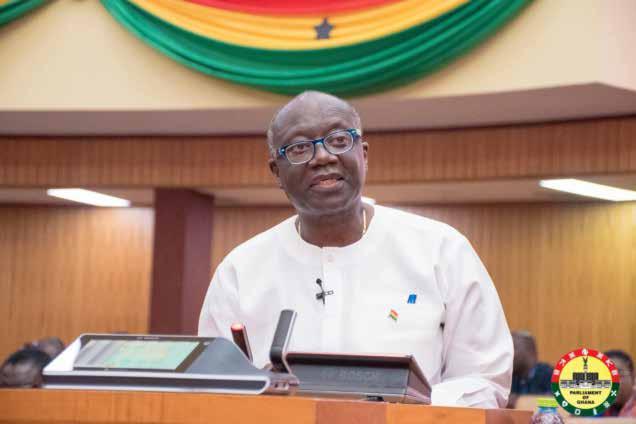
We, will therefore, continue to
work together to advance the progress of our external debt treatment, in order to ensure
Ghana’s long term macroeconomic stability”, it concluded.

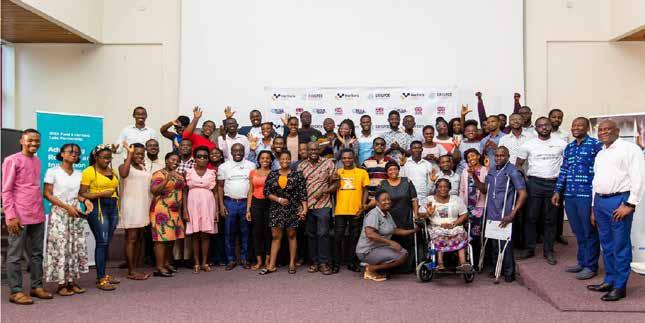
Heritors Labs Limited, a Web 3.0 company and a hub for research and innovation services, hosted a two-day training workshop to build entrepreneurship capacity and increase the participation of women, young people, and people with disabilities in the research and innovation commercialisation value chain. The event, dubbed "Levelling Up Training Workshop for Research and Innovation Commercialisation and Entrepreneurship", was held on February 21st and 22nd, 2023, at the Ghana-India Ko Annan Centre of Excellence in ICT (AITI-KACE).
Funded and supported by The Research and Innovation Systems for Africa (RISA) fund, FCDO and UKAID, the Levilling up training workshop is a part of Heritors Lab's continued e ort to drive the development of thriving value chains in the Science, Technology, Innovation and Research (STIR) ecosystem as well as advance the commercialisation of innovation and research outcomes in Ghana.
It can be recalled that in the year 2022, the Research and Innovation Systems for Africa (RISA) Fund, a multi-country project funded by the UK through the Foreign, Commonwealth and Development O ce (FCDO) to support research and innovation systems strengthening in Africa, awarded Heritors Labs a grant to boost the commercialisation of research and innovation in Ghana through deepening access to research and innovation programmes and building a robust infrastructure for the com-
munication, advocacy and marketing of research and innovation outcomes. The grant has resulted in the design of programmes and activities to facilitate the inclusion of marginalised and excluded segments of our society, such as women and individuals with disabilities, in the research and innovation value chain.
Participants were introduced to the available support programmes within the R&I Ecosystem and educated on the principles and practise of commercialising research and innovation. The objective was to successfully equip participants with the skills, knowledge, and platform to commercialise their innovative ideas and prototypes. In addition, participants' con dence in pursuing and developing valuable networks was bolstered, and they were encouraged to form meaningful partnerships. Furthermore, other topics treated at the training workshop included nancial management, funding support, research sales and marketing strategies, team building, and company structure and formation.
Derrydean Dadzie, the CEO of Heritors Labs, Ltd., opened the training workshop and addressed the cohort to kick o the training session. He reiterated that "indi viduals with disabilities and women are often overlooked and underrepresented in the STIR value chain. Notwithstanding, they can play critical roles using their other physical and intellectu al abilities to impact the ecosystem signi cantly."
Mr Dadzie explained that people with disabilities might be unable to
work as lab technicians or use delicate scienti c tools and equipment such as microscopes or simple ones like beakers. However, they may be capable of achieving success in elds like project management, research communications, software development, and technology advisory within the research and innovation ecosystem.
The levelling up training initiative aimed to build the innovation capacity of people with other abilities and women on how to commercialise their research and innovation ideas, thus empowering them to create their businesses and achieve nancial independence towards eradicating poverty.'

With the majority of participants having disabilities, the workshop provided individualised learning experiences and mentoring opportunities through one-on-one sessions with facilitators. A key highlight of the programme was when the participants were taken through a practical session on moving innovative ideas to market by renowned guest speaker, a Ghanaian inventor, Mr GM Adjabeng,
Cape Coast, Mr Adjaben is an inventor who is also the founder of Ecodyst Scienti c, the innovative creators of the next generation of rotary evaporators used by top scientists and scienti c laboratories around the globe. "We are excited about the impact this program will have on the lives of its participants and anticipate new partnerships in addressing other pressing challenges to bring the social gaps in the research and innovation commercialisation value chain," Mr Dadzie said.
The Heritors Labs Ltd. levelling training program was a crucial initiative that supported the Sustainable Development Goals by promoting gender equality and inclusion (SDG 5) and empowering individuals to achieve nancial independence towards eradicating poverty (SDG 1).
Heritors Labs believes it can signi cantly increase representation and meaningful participation of women, marginalised, and underrepresented groups, including persons with disabilities in the research and innovation ecosystem with the contin
For the cryptocurrency industry, 2022 was a year of immense upheavals, causing governments, consumers, and other associated stakeholders to question the debated topics of trust, credibility, and user protection in the cryptocurrency industry. Overall, this has created a need for organizations and leaders within the space to consistently reiterate their commitments, as well as demonstrate their initiatives geared towards building trust, ensuring user fund transparency, and fostering user safety. However, it is important to note that while the events from last year have permeated a sense of short-term distrust, the overwhelmingly undeniable truth is that crypto is here to stay - a testament to the innumerable applications of cryptocurrencies and blockchain technology, especially in terms of improving nancial inclusion and its simpli cation of borderless payment transactions. Moving ahead with user fund transparency
Perhaps, the most worrisome question on the minds of crypto users and investors is “Will my money be safe?” This inclination is entirely expected for a plethora of reasons. To avert the feelings of fear, uncertainty, and doubt (FUD), there is an undeniable need for reassurances that guarantee crypto users and investors the protection and nancial security they require.
For one, user funds must never be mismanaged and all measures must be maintained to keep user funds secure. Exchanges should
follow three very simple rules: hold user assets in custody 1:1, never trade against your users, and don’t take on debt.
The cryptocurrency industry needs to prioritize user protection and allocate resources accordingly, focusing on ensuring security and maintaining transparency. To achieve this, many exchanges have taken the initiative by publicly sharing wallet addresses and reserve proofs, as well as creating recovery funds.
Proof of reserves is considered one of the most e ective methods of increasing the transparency of user funds in cryptocurrency exchanges. Users have the right to verify the safekeeping of their assets held in a centralized exchange’s custody and the presence and nature of reserve assets on an exchange provide insights into the platform's operation; one of such reserves is Binance’s proof-of-reserves.
Additionally, education must be prioritized as users need to better understand the di erent crypto o erings on the market –so they can distinguish which ways are safe to enter and what actually makes certain crypto o erings trustworthy and reputable.
All exchanges must dedicate resources to provide their users with su cient knowledge about their products, services, and the broader industry. Materials should clearly explain the risks associated to enable users to make informed choices. These e orts will continue to help
rebuild trust within the industry and support future innovation. Regulatory compliance is key The importance of adhering to regulatory standards in establishing stability, credibility, and con dence in cryptocurrencies is often overlooked by some as they believe it hinders the underlying innovation that drives the crypto industry. However, smart regulation is bene cial to the safe custody of cryptocurrency and crypto providers must further shoulder the responsibility by engaging in open and ongoing communication about the structure of their products and the regulations that govern them. Like seatbelts in a car, a more regulated crypto market provides greater protections for everyday users. Another key lesson from the past year is that regulation can play a crucial role in the revival, long-term success, and broader
By Nadeem ANJARWALLA Nadeem ANJARWALLA
acceptance of cryptocurrencies, particularly in growing markets. By providing safety and peace of mind for users and conferring legitimacy, regulation can help restore the industry's image and renew consumers' trust in cryptocurrencies. After all, institutional interest will follow where regulation goes, further proving the value and legitimacy of the crypto industry.
To conclude, given the rapidly changing nature of the crypto industry and its protocols, it is imperative for the industry to collaborate and establish standards for the quality of security measures for exchanges and projects. Collaborating with law enforcement is crucial in order to support investigations and retrieve stolen funds. In addition, developing better incubation programs to equip new projects with adequate security measures is essential.
Production for Gold elds Ghana dropped by four percent to 838,000 ounces (koz) in 2022 from 871, 000 (koz) in 2021, mainly driven by decreased production at the Damang Mine due to completion of the Damang pit cutback as well as lower production at Asanko.
The Company indicated that all-in costs across the three mines increased by 10 percent to US$1,220/oz in 2022 from US$1,112/oz in 2021. However, the mines produced adjusted free cash ow, excluding Asanko, of US$219million in 2022 compared to US$292million in 2021.
Its interim Chief Executive O cer (CEO), Martin Preece, in a statement also noted that assets in the company’s portfolio are maturing and reaching the end of their lives, highlighting low output by the Damang Mine.
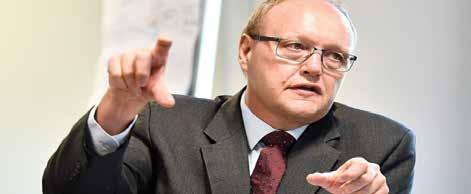
“There are assets in the portfolio which are maturing and reaching the end of their lives. 2022 was the last year of steady-state production at Damang post reinvestment in the pit cutback. In 2023, production from Damang will come from a combination of ore from the Huni pit and stockpiles, with only stockpiles being treated from 2024 onward,” he
said.
He however noted that his out t is concerned with the political and economic environment in the country, particularly in the latter part of 2022 and early part of 2023 as it has become more challenging for businesses in the country to
operate
“It is however, engaging with government individually and through industry bodies to reiterate its stance on key matters as the process of claiming certain rebates relating to Development Agreements has become more
burdensome,” he said. While Damang gold production decreased by 10 percent to 230,000oz in 2022 from 254,400oz in 2021 due to lower yield as a result of lower grade of ore processed, Tarkwa gold production increased by 2 percent to 531,600oz in 2022 from 521,700oz in 2021, mainly due to higher tonnes processed and improved yield.
Asanko which is an Equity-accounted Joint Venture also saw gold production decrease by 19 percent to 170,300oz (100 percent basis) in 2022 from 210,200oz (100 percent basis) in 2021, of which 76,700oz (2021:
94,600oz) was attributable to Gold Fields.
The decrease was mainly due to lower yield, which decreased by 17 percent to 0.91g/t in 2022 from 1.10g/t in 2021. The lower yield was a direct result of lower grade ore processed from stockpile in 2022 compared to higher grade fresh ore and stockpiles in 2021.
For Damang, yield decreased by 11 percent to 1.50g/t in 2022 from 1.68g/t in 2021. This was due to the completion of Damang Pit in November 2022, and mining through transition in the lower grades of Huni pit.
In Tarkwa, Yield increased by 1 percent to 1.18g/t in 2022 from
1.17g/t in 2021 due to higher grades processed. Ore rehandled from stockpiles was 1,250kt at a head grade of 1.42/t in 2022 compared to 3,336kt at a head grade of 0.78g/t in 2021.
The Company noted that it will continue to work on the future of both the Damang and their share in Asanko and will provide an update to the market in due course.
It also noted that assets in the company’s portfolio are maturing and reaching the end of their lives, highlighting low output by the Damang Mine.
“There are assets in the portfolio which are maturing and reaching
the end of their lives. 2022 was the last year of steady-state production at Damang post reinvestment in the pit cutback. In 2023, production from Damang will come from a combination of ore from the Huni pit and stockpiles, with only stockpiles being treated from 2024 onward,” the company said.
Gold Fields says it has limited organic growth opportunities in its current portfolio, and as such will need to pursue inorganic opportunities to bolster the pipeline. These options will include green eld targets, development projects or bolt-on acquisitions of producing assets.
Two of Amazon's best-selling female authors, Hazel Herrington and Karen Mc Dermott have together with 12 other women co-authored a new book on diversity.
The book, titled: 'Lady Diversity Power: Why Diversity Is the New Way to Do Business', was launched by Herrington Publications Worldwide and KMD Books on February 28, 2023.
The 12 other remarkable women from diverse backgrounds who co-authored 'Lady Diversity Power' are: H.E. Laila Rahhal El Atfani, Naila Qazi, Linda Fisk, Kelly Markey, Joanna James, Hilda Johani CMA, Dr. Khomotso Mashalane, Lisa L. Levy, Annie Gibbins, Cathy Dimarchos, Dr. Ingrid Vasiliu-Feltes, Sarah Blake, Shelli Brunswick, and Toni Lontis.
Among other things, 'Lady Diversity Power' which is available for order via: http://www.kmdbooks.com/ladydiversitypower, shares inspiring stories and practical advice on why diversity is the new way to do business globally.


Lady Diversity Power is a must-read for people looking to build more "inclusive and equitable workplaces."
In the Foreword of 'Lady Diversity Power', H.E Laila Rahhal El Atfani says "The business world is chang-
ing. The days of the white, middle-aged man running the show are coming to an end. In their place, we are seeing a new kind of leaders: one who understands and values diversity."
Touching on why diversity is the new way to do business, Ms. Herrington stated that "Lady Diversity Power is a concept that encapsulates the idea that diversity is a strength, not a weakness. It is about recognizing and celebrating the unique perspectives, experiences, and talents that women from diverse backgrounds bring to the table."
According to her, "in today's rapidly changing global marketplace, diversity is no longer just a moral imperative, it is a strategic one. Companies that fail to embrace diversity risk being left behind, while those that actively seek it out and cultivate it stand to thrive in the new global economy. By empowering women of diverse backgrounds to lead, we can create more innovative, inclusive, and equitable workplaces that bene t everyone."
She explained that "Lady Diversity Power is not just a catchphrase, it's a call to action for all leaders to embrace the richness of Diversity and harness its power for the bene t of all."
About the authors
Ms. Herrington, a multiple award-winning Zimbabwean author, celebrity interviewer and CEO of Herrington Publications Worldwide, has authored several other books including: 'Personal Branding: Build Credibility and Elevate Your BrandThe Ultimate Guide:', 'How to Achieve Personal Growth - The Essential Guide,' and 'The Ultimate Speaker Branding Blueprint on How to Build a Strong Personal Brand', all of which are available on Amazon.
She is also a co-author of a number of books including: 'Mediation Beyond Covid', 'A Woman's Guide to Business Domination,' and 'Think Limitlessly.'
Karen Mc Dermott is the founder of Serenity Press, Making Magic Happen Academy and Everything Publishing Academy. An award-winning entrepreneur,
multi-genre author of over 20 books, mentor and renowned speaker, Mc Dermott founded Serenity Press in 2012.
Linda Fisk is a multi-award-winning leader, speaker, best-selling author and university professor dedicated to amplifying and extending the success of other high-calibre business leaders.

Dr. Khomotso is a globally recognized humanitarian, philanthropist and women empowerment advocate.
H.E Laila Rahhal El Atfani, is a globally respected women empowerment advocate and successful businesswoman. Meanwhile, Ms. Herrington and Mc Dermott, two renowned, internationally-acclaimed authors, are scheduled to soon launch another book titled: 'Lady Entrepreneur Power'.
Today, over 70 million people are displaced as a result of con ict, violence, persecution, and human rights violations. Half of them are children. With so many people around the world su ering as a result of war and violence, a peace dialogue is important as ever now. This dialogue must symbolize hope for peace. The call to imagine this Rotary year is equally a call to prioritize dialogue on peace to promoting global peace and security as our collective responsibility, in a world in which peace amongst other factors will support promote Sustainable Development. This peace event was put together to commemorate Rotary’s 118 years and to celebrate the power of global solidarity for building a peaceful and sustainable world. This dialogue on peace was a joint project with Rotary International District 9102’s ve clubs in Ghana.
The Rotary Club of Accra in partnership with Rotary Clubs of Accra- East, Morning Tide, Weija West and the Rotaract Club of the University of Ghana Legon on February 27, 2023 held this peace symposium at the Labadi Beach Hotel. This peace event was graced by Rotary leaders and dignitaries to include the District
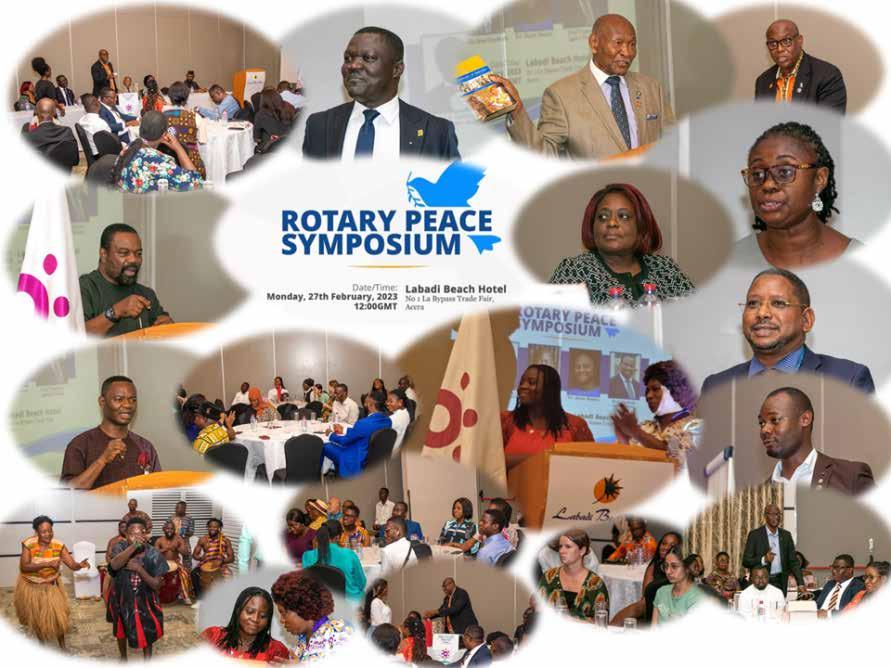 By Baptista S. Gebu
By Baptista S. Gebu
Governor Victor Yaw Asante, District Governor Nominee Maame Hagan, Past Rotary International Director and former Council of State member Hon. Samuel Okudzeto who was the Chairman for the occasion, Past Assistant Governor and Chair of the Peace Symposium Planning Committee - Jack Andrews Dotsey. Professor Vladimir Antwi Dansoan international relations and security expert, Mrs Janet Sarney-Kuma – a director responsible for capacity development outreach with the Peace Council representing the Chairman of the Peace Council, and Mr. Abdourahamane Diallo of UNESCO representing the UN Resident Coordinator took turns to address the gathering on peace and security trends. Present were other Rotary district leaders, Imagine Presidents, fellow Rotarians, Rotaractors and guests.
The event was called to order by the Rotarian President Michael K. Frimpong of the Rotary club of Accra who re-iterated the event concept and gave way for speaker’s submission on the theme. This paved way for participant’s engagement and with some cultural performance put up by the Asante Traditional Cultural
Troupe. The Event was facilitated by the District Vocational Training Teams and Rtn Juliet Amoah, the Rotary Peace Fellowship Chairs respectively. To strive for peace, we must all refuse to accept con ict as a way of life. We all can support a call to cease re of all hostilities around the world. This Russia – Ukraine war is costing world peace and a ecting not only global supply chains but a number of very important thematic issues. Elections are ongoing in the sub regions. Ghana’s election 2024 will be underway soon. Hence a call for stakeholders and all people of goodwill to focus on peace dialogue is a call in the right direction.
New forces of division have emerged, spreading hatred and intolerance. Terrorism is fueling violence, while violent extremism seeks to poison the minds of the vulnerable and young. In the poorest and least-developed parts of the world, climate-related natural disasters are compounding existing fragility, increasing forced migration and heightening the risk of violence.
Since 2002, The Rotary Foundation provides sponsorship for130 Peace Fellows each year globally at 8 universities for a certi cate or
a master’s degree programme. The Rotary Peace Fellows are contributing to global peace through their various professions across industries.
The barriers to peace are complex and steep - no one country can solve them alone. Doing so requires new forms of solidarity and joint action, starting as early as possible. To approach the concept of peace with greater cohesion and inclusivity, broadening the scope of what we mean by peace building, we all need to nd more ways for people to get involved in peace dialogue which begins with you.
Rotary is a global network of 1.4 million neighbors, friends, leaders, and problem-solvers who see a world where people unite and take action to create lasting change – across the globe, in our communities, and in ourselves. Solving real problems takes real commitment and vision. For more than 110 years, Rotary's people of action have used their passion, energy, and intelligence to take action on sustainable projects. From literacy and peace to water and health, Rotarians are always working to better our world, and stay committed to the end.
The Ghana Cocoa Board (COCOBOD) says it has lost GH¢4.8 billion worth of investment in 35 hectares of cocoa farms to illegal mining (galamsey) activities at Boinso in the Western Region.

The investment covered the planting of new cocoa trees and plantain suckers, compensations to landowners and farmers, extension services, among other activities it was undertaking to scale up the country’s cocoa production.
Rev Edwin Afari, Executive Director, Cocoa Health, and Extension Division said a recent visit to the area saw that all the cocoa trees they planted had been cut down for galamsey.
“We have not even accounted for the harvesting that will be coming. It is just the investment; all the work we have done over there has gone to waste and so you can imagine what is happening,” he lamented.
He was speaking to the Ghana News Agency (GNA) on the sideline of a ceremony to award some 15 blind cocoa farmers, a novelty by the Board to whip up interest in cocoa farming, particularly among Persons with Disabilities.
He observed that galamsey had had a dramatic impact on the cocoa industry in Ghana over the last 10 years, and as a major earner of foreign exchange, the country could su er the blunt if the illegality continued.
Rev Afari averred that the State cocoa company was facing a hard time reviving the industry as cocoa farmers were giving out their farms willingly or under compulsion for galamsey.
“In the southern part of the Western North and some parts of Ashanti Region, especially the Manso Adobea, Antoakrom and the Enyinam areas, a lot of the miners are causing us a lot of trouble.
“They are cutting away all the newly planted cocoa trees that we have, and it is really causing us a lot of investments, “she said.
He said Ghana risked losing its cocoa and, therefore, called on government, the Minerals Commission, and chiefs to help ght the menace to save the industry by not giving out concessions in cocoa-growing areas.
“Because this is what gets us
foreign exchange and shores up our Cedi when it is depreciating, and also gives government more room to invest in all the development areas,” he said.
And to the farmers, Mr Afari noted that “the lump sum money may be good now but not in the future because cocoa is there all the time.
“If you do it well and you get 25 bags per hectare, you will be getting more money than you are getting now.”
He further expressed concerns over the aging population of cocoa farmers, citing the atten-
dant looming dire impact on the economy and general development.
He was worried that many young people were not interested in agriculture in spite of the vast potential in the sector.
He admonished the youth, especially professionals from all elds, to venture into cocoa to create wealth for themselves and the country.
Rev Afari said the country was targeting 850,000 tonnes of cocoa this year as against last year’s 683,000.
Faced with growing investment gaps, most European policymakers seem to think it is time for another broad-based stimulus package, despite high in ation and high levels of public debt. But I am afraid they are wrong.
Stimulus would simply force the European Central Bank to increase interest rates further and faster. What we need instead is targeted support, namely investments in sectors that are green and likely to promote resilience and competitiveness. The necessary resources must be mobilized quickly and on an EU-wide scale, with the express goal of mobilizing private investment.
There has been much handwringing in Europe over the threat posed by the US In ation Reduction Act. Yet despite all the fears it has provoked, the IRA is ultimately a step in the right direction. It provides massive support for green sectors where more investment is urgently needed, and it shows that the United States and Europe are nally aligned in pursuing a sustainable economic transformation. Europeans should welcome US eagerness to
scale up its renewable-energy capacity, and that it is putting its money where its mouth is.
The IRA’s goal of building modern low-carbon infrastructure is not itself a problem for the European economy. On the contrary, in sectors like wind energy, where Europe is a technology leader, higher investment demand is a positive development. In addition to having a positive e ect on the climate, US subsidies will provide new business opportunities for European rms.
To be sure, some elements of the new US policy present challenges.
The IRA o ers substantial support for solar panels, wind power, energy storage, and clean hydrogen equipment, but most of these bene ts are limited to producers who can claim “made in America” status. This setup of course excludes European manufacturers, who do not receive the same subsidies from the European Union.
That raises the risk that some European equipment manufacturers and hydrogen producers pull up stakes and move to the US, adding to the plight of the EU’s
already under nanced innovation sector. Just when we need to reinforce the emerging supply chain for green tech, some of the IRA’s provisions could disrupt it – beneting America at Europe’s expense. But, by keeping open communication channels with our American partners and targeting our own investments to the right sectors, Europe can neutralize the problematic parts of the IRA while still capitalizing on the good parts. Such dialogue is crucial, because we do need to persuade the US to reconsider some of the IRA’s provisions, especially those that go against longstanding principles of open and fair competition. In pursuing such talks, however, we must not present ourselves as victims. Europeans should accept that many of our current investment gaps lie far beyond the scope of the IRA. As the European Investment Bank’s annual agship report shows, over the past ten years, Europe has invested 2% less per year in productivity enhancements than its competitors have. The IRA should be seen as a wake-up call for addressing
this under-investment. We urgently need to funnel more money into European clean power, cleantech manufacturing, and digitalization – all of which are crucial to the green transition and future competitiveness.
This may sound like a big job, but the truth is that we already have most of the tools that we need. The EIB Group provides a wide array of risk-sharing and long-term nancing solutions that can make promising innovations more palatable for private investors. Our model for crowding-in capital has allowed us to kick-start major breakthroughs in life sciences, the energy sector, quantum computing, and satellite technologies. We can send a strong signal to the market that EU institutions and governments are willing to promote cutting-edge technologies with debt and equity investment from the very early stages of development. We are ready to work with the European Commission and EU member states to create a new pan-EU equity fund to support large ventures
that are strategically important for the net-zero economy. Some might wonder why we would focus on large ventures, given that “ventures” tend to call to mind start-ups that entrepreneurs launch in their garages. But, in fact, we are seeing more and more massive ventures emerging at the cutting
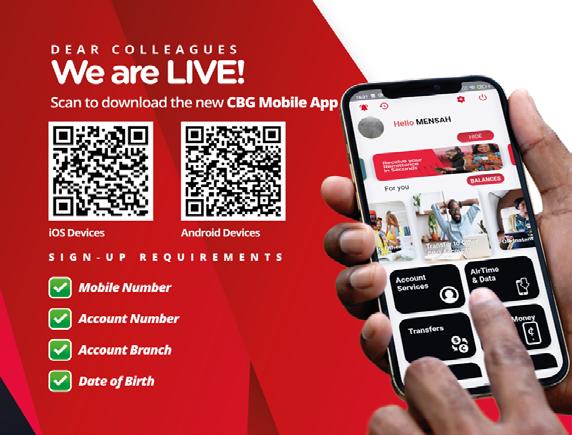
edge of innovation. Consider battery producer Northvolt, with its new giga-factory in northern Sweden. It is a startup, but you would need a thousand garages to accommodate it. Ventures of this size are precisely what Europe needs, and they require multibillion-euro investments up front, usually in the
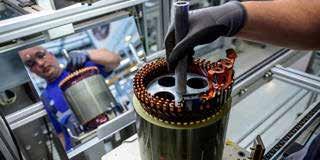
form of equity and equity-type funding. An EU equity fund thus could add signi cant value by helping more cutting-edge rms get started. And though the investments I am talking about are huge, they would also be precisely targeted. The beauty of this approach is that it is pan-European. It would

promote a level playing eld for EU member states and thus protect one of our key achievements: the single market. It also would help us confront our global challenges without casting aside our values. It would be a quintessentially European response to the IRA and to the broader geopolitical challenges Europe faces.
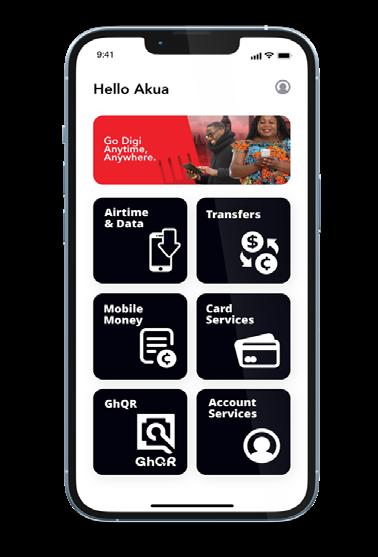

Forget Nigeria’s election: it’s the Naira shortage that markets are watching
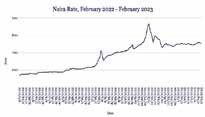
32%
As Nigerians prepare to go to the polls on Saturday to elect a new president, a cash shortage caused by a policy to exchange old Naira notes for newly designed bills continues to cripple the economy, creating a rift in the ruling All Progressives Congress (APC) party. The note swap plan championed by incumbent President Muhammadu Buhari has led to violent protests across the country and resulted in a temporary suspension of banking operations in some states. Several governors have petitioned the Supreme Court to overturn the policy, citing severe hardship faced by people and businesses dependent on cash for survival. Buhari’s apparent intention behind the policy is to curb vote buying by politicians, turning a deaf ear to APC governors who have made repeated calls to postpone the implementation of the policy. Amid fears of the current tensions spilling over to political violence, Buhari said he’s mobilising military and security agents to monitor polling stations for evidence of vote rigging. The severe cash shortage has held the currency steady in spite of the economic turmoil, with the Naira strengthening marginally against the dollar to 755 from 756 at last week’s close. In this context, resolving the cash shortage has become more significant for the Naira outlook than the election result—with the rate likely to hold around current levels until Naira supplies recover.
Ghana’s latest ratings downgrade drives Cedi lower


The Cedi weakened against the dollar, trading at 12.76 from 12.38 at last week’s close as Fitch Ratings cut Ghana’s foreign currency credit rating to ‘restricted default’ after the country missed a $40.6m coupon payment on one of its outstanding Eurobonds. The downgrade aligns with Fitch’s local currency rating, which was cut earlier this month. The foreign debt default was largely expected after Ghana said it would suspend payments on certain bonds as part of its restructuring plan to unlock $3bn in emergency funding from the IMF. The country faces pushback from bondholders over preferential treatment for bilateral lenders, who are being offered better terms in the debt restructuring. Against this backdrop—and with inflation remaining elevated despite a slight improvement in January—we expect the Cedi to depreciate further in the near term.
Alex Barmuta

Rand sinks to lowest in more than 3 months

The Rand depreciated against the dollar, trading at 18.25 from 18.05 at last Friday’s close—its weakest level since early November. The currency is being dragged lower by broad risk-off sentiment globally and ongoing domestic concerns about the electricity crisis. In an effort to ease concerns about Eskom’s finances, South Africa’s government said it will take on more than half of the power company’s debt over the next three years to help strengthen the balance sheet and avoid the risk of default. We expect the Rand to continue trading with an 18 handle in the near term, mainly due to the risk-off mood that is impacting emerging markets FX.
Egypt issues debut $1.5bn sukuk
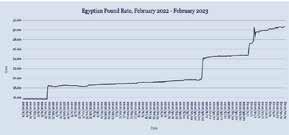 Mitch Diedrick
Mitch Diedrick
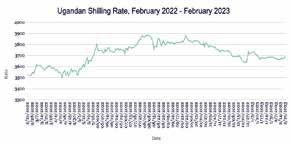
The Shilling strengthened against the dollar, trading at 3674 from 3684 at last week’s close. Uganda’s central bank kept its benchmark interest rate on hold at 10% for a second consecutive monetary policy meeting. The bank last raised by 100 basis points in October, with rates ending the year 350 basis points higher than they were at the start of 2022. Policymakers said the decision to hold rates was aimed at containing domestic demand pressure and supporting economic recovery. The bank said it expects inflation to slow to its 5% target by the end of the year despite inflation edging up to 10.4% last month. In the near term, we expect the Shilling to weaken amid continued food and energy price inflation.

The Pound depreciated against the dollar, trading at 30.60 from 30.48 at last week’s close, amid broader risk-off sentiment and a stronger dollar. Egypt this week issued its debut Islamic finance bond, or sukuk, raising $1.5bn. The three-year deal priced to yield 11%, having attracted investor demand of more than $5bn. The deal provides some relief to Egypt’s finance ministry given the country’s need to boost FX inflows and repay existing debt. We expect the Pound depreciate further in the week ahead mainly due to dollar strength.


The Shilling weakened to a fresh low against the dollar, trading at 126.15 from 125.90 at last week’s close amid increased FX demand from the oil and energy sector. The currency has now lost more than 2% of its value this year. Kenya’s foreign currency reserves also dropped to a new record low $6.88bn from $6.94bn the previous week. There are signs of recovery in FX flows: Kenya secured a $27m funding deal with the European Union to boost exports to the 27-nation bloc and strengthen the overall business environment. The government is also anticipating $3.4bn in tourism-related earnings this year as it expects tourist numbers to exceed pre-pandemic levels. In the immediate term, however, we expect the Shilling to remain under pressure as importers clamour for dollars to meet month-end obligations.
11.7%


EDITION: 09 /23
At the just ended Treasury Bill auction , there was a 100% subscription rate across all tenors with government accepting total tendered bids to the tune of GH¢5.067 billion across the 91, 182 and 364- day bills, despite an announc ed target of GH¢2.885 billion
The week-on-week yields witnessed a n overall drop of 12bps and 16bps across the 91 and 182-day bills respectively. Unlike the previous week, there was an auction for 364-day bill with a closing yield of 34.21%
G G o o v v e errn n m m e e n ntt po o s sttp p o o n n e e s s m m e e e etti i n n g g w wiit t h h C C h hiin n a a o o n n d d e e b btt c c a a n n c c e elll l a atti i o o n n tto o M M a arrc c h h 20 0 2 2 3 3
G G o o v v e errn n m m e e n ntt a a n n n n oun n ce e s s s s e ettt tlle e m m e e n ntt o off D D D D E E P P p prro o g grra a m m m m e e.
G G h h a a n n a a’’s s llo o c c a all d d e e b btt s s c c o orr e e rra aiis s e e d d b b y S S & & P P a a s s d d o o m m e e s stti i c c d d e effa a u ullt t c c u urre e d d





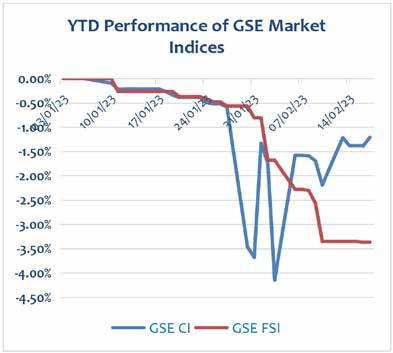
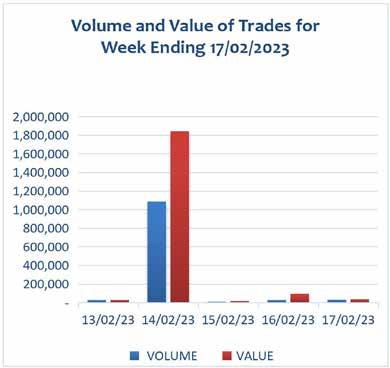
J anua r y 20,202 3
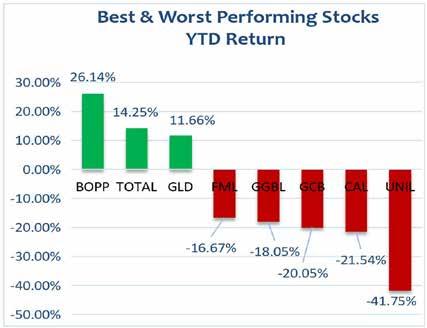

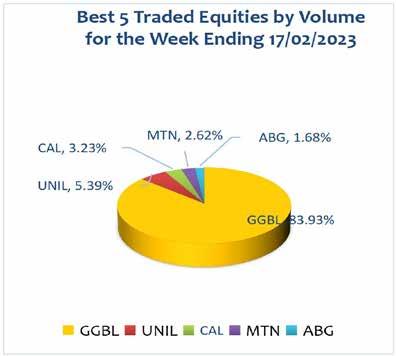
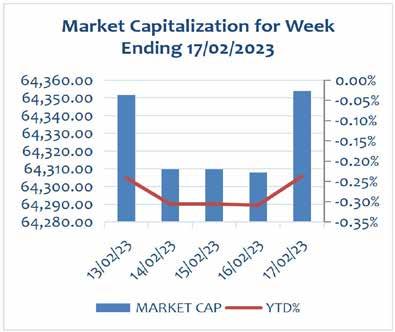

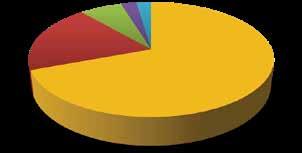
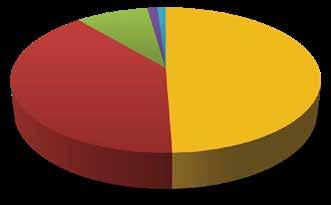
February 17, 2023

J anua r y 20,202 3 February 17, 2023
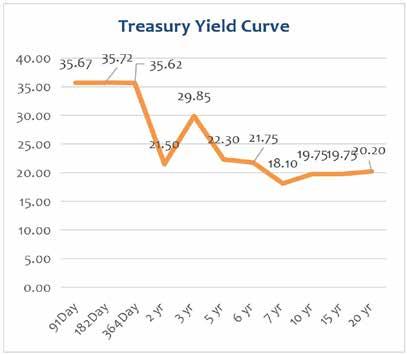
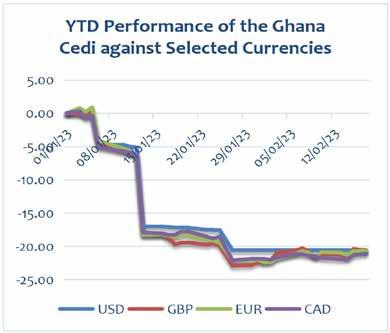
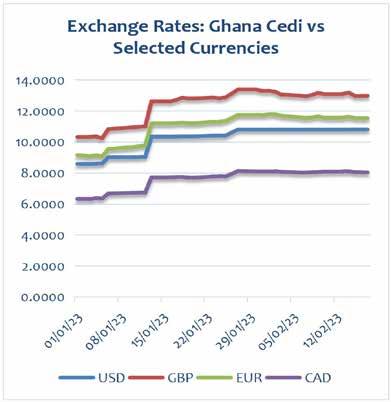




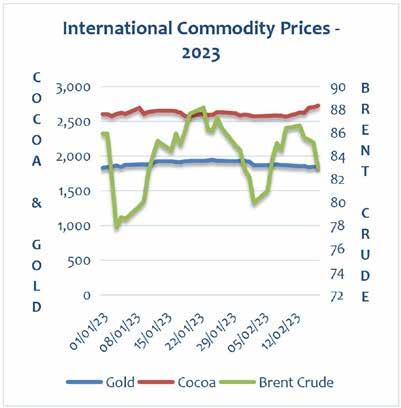

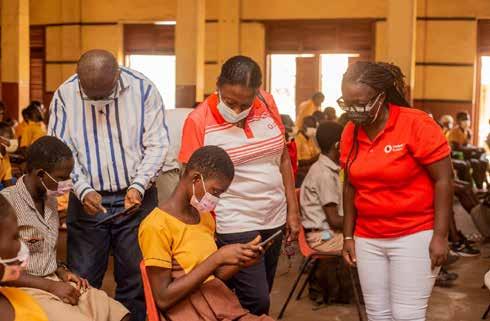
As the world continues to evolve and digital advancements shape the way we live, work, and learn, the demand for digital skills and competencies grows ever stronger.
The global economy is rapidly shifting towards a digital-based model, and this trend is re ected in Africa, where the mobile and Internet industries are driving socio-economic growth and development.

However, despite this progress, the digital divide remains a signicant challenge in many African countries, including Ghana. A survey conducted by the Ghana Statistical Service in 2016 revealed that a mere 8.6% of Ghanaian households had access to the Internet. This highlights the need for greater investment in digital connectivity and access in Ghana. Moreover, a report by the International Finance Corporation (IFC) highlights that there is a signi cant gap in supply and demand across all skill levels in Sub-Saharan Africa. This digital skills gap presents a major obstacle to realizing the full potential of Africa's rapidly growing digital industries and underscores the importance of prioritizing and investing in digital literacy and technology education across the continent.
It is imperative that Ghana, along with other African countries, takes proactive steps to close the digital skills gap and prepare its workforce for the jobs of the future.
To address the digital skills gap in Ghana, it's crucial for the country to prioritize and invest in digital literacy and technology education. By doing so, individuals in Ghana will be better equipped to take
advantage of the growing number of job opportunities in the digital sector and be prepared for the future workforce.
Vodafone Ghana is taking a leading role in transforming digital education in the country by partnering with the Kwame Nkrumah University of Science and Technology (KNUST) to open a digital learning centre on campus. The centre is designed to provide remote education to students and is equipped with state-of-the-art digital tools and technology. The project, which is part of Vodafone Ghana's “Connected Education” service, is aimed at contributing to the education of the youth and the future of Ghana.
The Connected Education service
o ered by Vodafone Ghana includes a range of mobile services that allow students and school administrators to work together e ciently. The services include discounted mobile data, free calls, access to online resources, and wide-area network solutions with dedicated internet. Vodafone Ghana is also providing managed Wi-Fi and uni ed communication services and enabling a cashless campus through Vodafone Cash.
Soon, Vodafone Ghana aims to empower teachers through its Connected Education service by providing them with the necessary tools and resources to integrate digital learning into their lessons. The company realizes the crucial role teachers play in the education system and seeks to support their e orts by o ering training services that cater to their unique needs and help them design e ective hybrid lessons.
Vodafone Ghana recognizes the
importance of addressing the digital skills gap, as research shows that a signi cant percentage of teachers lack experience and formal training in using technology in the classroom. The company believes that its Connected Education service will serve as a solution that not only provides access to digital learning tools, but also supports the upskilling of teachers.
Vodafone Ghana is committed to providing access to high-quality education and empowering students and teachers through technology. To further this mission, the company has partnered with the Ministry of Education and other local educational institutions to launch Instant Schools, the largest philanthropic program in the Vodafone Group Foundation's 25-year history. Instant Schools provides free access to online learning materials for millions of young people in Africa, including subjects such as Math and Science from primary to secondary level. The educational
content is a combination of high-quality global and local content, initially provided by Khan Academy, with the aim of aligning it with the local curriculum in the future.
The service is designed for simple, low-cost devices with basic data connectivity (3G) and is zero-rated for Vodafone Ghana subscribers, meaning users will not be charged for data usage within Ghana when accessing the content through the company's mobile data network. However, data charges will apply if the service is accessed outside the country.
As a long-term cumulative program, Vodafone Ghana aims to increase the reach, scale, and relevance of Instant Schools over time, including encouraging other major mobile operators in the country to adopt a similar approach. This initiative underscores Vodafone's dedication to using technology to build more inclusive and resilient societies, ensuring that every generation can participate in the digital economy of the future.